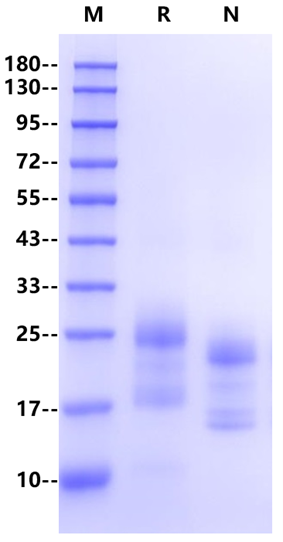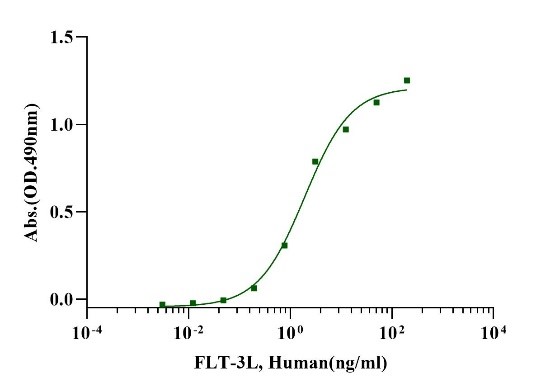



 下载产品说明书
下载产品说明书 用小程序,查商品更便捷
用小程序,查商品更便捷



 收藏
收藏
 对比
对比 咨询
咨询>95% by SDS-PAGE
>95% by SDS-PAGE



>95% by SDS-PAGE









Fms-like tyrosine kinase 3 (FLT-3) is a cytokine receptor expressed on the surface of bone-marrow progenitor of hematopoietic cells. FLT-3 ligands (FLT-3L) are produced by peripheral blood mononuclear cells, and found in various human body fluids. FLT-3L is a cytokine that promotes the survival, proliferation, and differentiation of hematopoietic progenitors in synergy with other growth factors, such as stem cell factor. FLT-3 signal is involved in the regulation of vessel formation as well as B cell differentiation, suggesting that FLT-3 signal contributes to the pathogenesis of vascular abnormalities and immune dysregulation in rheumatic diseases. The FLT-3L plays a role in complex cytokine interactions in the process of proliferation and differentiation of various hematologic periods while it is a router in early cell interactions. The FLT-3 receptor is a transmembrane protein that reaches its biologically active form by proteolytic lysis. It was suggested that with its proliferative activity, the FLT-3L also has an antitumor effect. The FLT-3L is an earlier releaser of the progenitor cells from the stem cell pool according to GM-CSF and G-CSF actions, which occur later. Additionally, a study on mouse models showed that the FLT-3L increases the blood amount of CD34 cells. These features gave rise to the idea that recombinant FLT-3L could be used in bone marrow transplantation to evoke cell mobilization. Similarly, some authors theorized that the FLT-3L could be used in many pathological diseases such as Fanconi and aplastic anemia that originated from stem cell defects.


· 3 months, -20 to -80℃ under sterile conditions after reconstitution.
· 1 week, 2 to 8℃ under sterile conditions after reconstitution.
· Please avoid repeated freeze-thaw cycles.
参考图片
1μg (R: reducing conditions, N: non-reducing conditions).
Determined by the dose-dependent stimulation of the proliferation of human OCI-AML5 cells.The EC50 for this effect is less than 2ng/ml.






 危险品化学品经营许可证(不带存储) 许可证编号:沪(杨)应急管危经许[2022]202944(QY)
危险品化学品经营许可证(不带存储) 许可证编号:沪(杨)应急管危经许[2022]202944(QY)  营业执照(三证合一)
营业执照(三证合一)